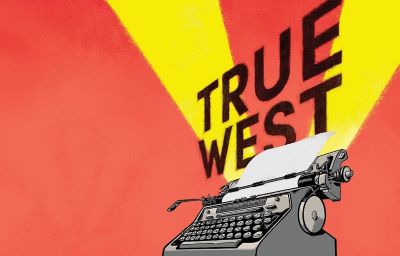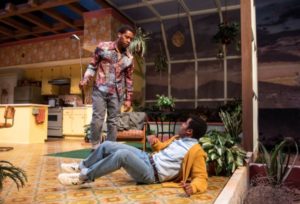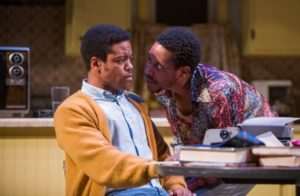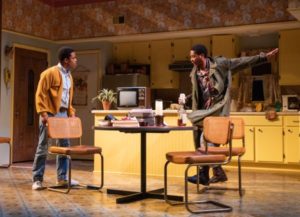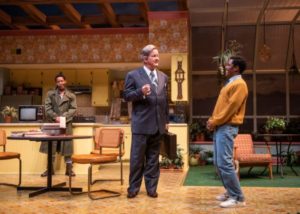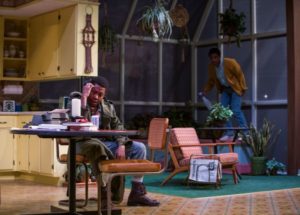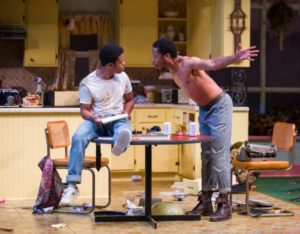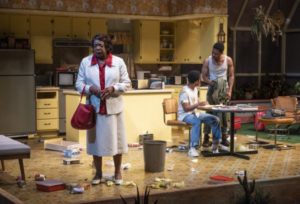SIBLING WARFARE
Can lightning strike again after 37 years? In 1982 Steppenwolf Theatre Company put itself on the map with a landmark staging of Sam Shepard’s domestic disruption True West starring Jeff Perry, John Malkovich, and Gary Sinise (in the Broadway transfer). Nearly two generations later, it’s back — in a rightly reckless reprise directed by Randall Arney and now featuring three African-American actors as the much-damaged family.
This two-hour two-act can certainly support the chemistry of change: Still set in 1980 in a desert-ed Southern California suburb, it remains a visceral look at played-out Wild Western stereotypes, familial envy and revenge, and false values surfacing as Hollywood clichés. As with David Mamet’s Speed-the-Plow, it depicts a very un-meritocratic Tinsel Town. And like Harold Pinter’s plays, it’s about how loved ones can displace or replace each other, trading places through implacable identity crises and psychological warfare.
Squatting in and ultimately vandalizing their mother’s plush place, Austin and Lee are dangerously different brothers who ideally should be separated by a court order. House-sitting for mom while she’s mysteriously in Alaska, Austin (Jon Michael Hill) is the responsible son, a budding studio screenwriter on the make and treading on success. He pecks at his typewriter, struggling to finish his treatment of a love-story screenplay.
In contrast, making an unexpected visit that soon becomes a hostile takeover, Lee (Namir Smallwood) is a predatory drifter and grifter who robs homes and promotes dog fights. You can call him “Mojave Man”: He’s spent three days in that desert, confusing homelessness with authenticity. And he carries a lot of unprocessed anger at Austin’s fortunes, his drunken jailbird dad, and his brother’s supposedly unearned security.
The core crisis comes down to the siblings’ perverse perplexity over how they ended up so different. Who really got the better deal? Austin craves Lee’s “adventure” and Lee wants fame without effort. Well, never wish for what you can’t grow.
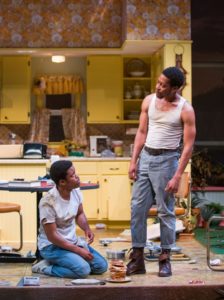 Lee soon develops a sinister and suspicious interest in Austin’s storytelling skills, which he thinks he can match with his more genuine grasp of the old — and new — West. He comes up with a crack-brained scenario for a prairie caper involving jealous foes chasing each other across a tornado-ridden Texas panhandle, first in cars, then horses. Surprisingly, this silly sketch attracts the interest of Saul Kimmer (Francis Guinan), Austin’s milquetoast producer. He invites Lee to golf with him and encourages his fledgling efforts while palpably losing interest in Austin’s.
Lee soon develops a sinister and suspicious interest in Austin’s storytelling skills, which he thinks he can match with his more genuine grasp of the old — and new — West. He comes up with a crack-brained scenario for a prairie caper involving jealous foes chasing each other across a tornado-ridden Texas panhandle, first in cars, then horses. Surprisingly, this silly sketch attracts the interest of Saul Kimmer (Francis Guinan), Austin’s milquetoast producer. He invites Lee to golf with him and encourages his fledgling efforts while palpably losing interest in Austin’s.
Slowly and painfully, the brothers — one a passive-aggressive chameleon and con-artist, the other a too-tractable dupe — get caught up in a tragedy of transference: One’s rise maddeningly requires the other’s fall. Desperate to preserve his Ivy League privilege, a heavy-drinking Austin turns rabid with resentment. He tries to equal Lee’s burglaries as they compete for who can steal the most toasters (strangely funny stuff). Losing it fast, Austin wackily plans to run off to the desert to purify his craft. (We know he won’t last a day.)
It doesn’t help that when Mom (Jacqueline Williams) comes back to her now-trashed home, she’s revealed as a hapless enabler who prefers looking at icebergs or meeting Picasso (though he’s dead) to preventing her boys from committing fratricide.
There’s no Hollywood ending here whatsoever. If ever a play proved entropy by making things fall apart, it’s this subversive show, the late Sam Shepard’s characteristically sardonic depiction of a self-destructing family worshipping the “bitch goddess success.”
Pulling no more punches than the play, Arney’s kick-ass staging plays up the violence at the expense of detailing the sibling’s switcheroo. Hill is good at showing Austin’s vulnerability: He’s a too-nice guy out of touch with his feelings and plagued by gratuitous guilt. Snarling and surly from start to finish, Smallwood certainly conveys Lee’s alpha-male, bully-boy pyrotechnics. What’s less obvious (as in hardly evident) is the insinuating charm that would win over Guinan’s pliable idiot of a producer. Williams’ mystifying mother remains, as written, AWOL.
Set designer Todd Rosenthal’s luxurious ranch-house suggests what the play never discloses — the divorced mother’s tangible wealth. What stays sure is the drama’s cage-match ferocity — perhaps its own reason for being — erupting between two mutually exclusive brothers. To cite one of the many Western clichés that Shepard undermines, this house ain’t big enough for the both of them.
photos by Michael Brosilow
True West
Steppenwolf Theatre Company
Steppenwolf’s Upstairs Theatre
1650 N Halsted Street
ends on August 25, 2019
for tickets, call 312.335.1650 or visit Steppenwolf
for more shows, visit Theatre in Chicago
